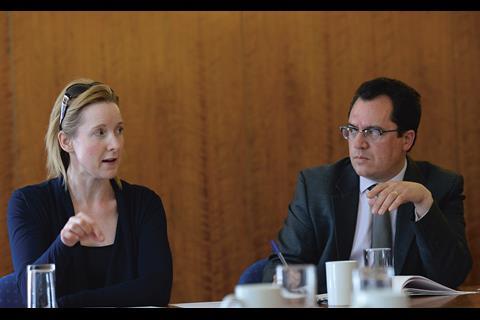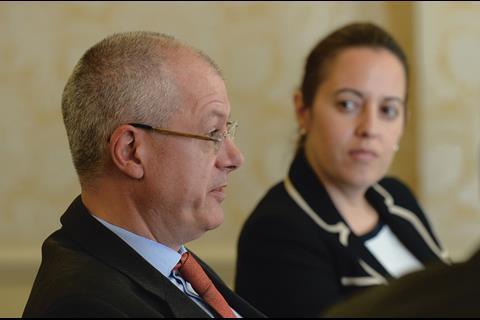Public sector lawyers retain a keen service ethic, hears Eduardo Reyes at the latest Gazette roundtable. But in-house professionals and their law firm advisers are under pressure to think like entrepreneurs as they are challenged to do more for less.
Austerity and the pressure to embrace more commercial methods have not dented the public service ethos, attendees at the Gazette’s public sector roundtable insist.
But tight finances and the expectation of a more ‘entrepreneurial’ approach have combined to make working in, or advising, the public sector an increasingly complex business.
Consolidation has been one common response – seen in the ‘shared services’ models adopted across the Government Legal Service and local councils.
Eleanor Hoggart could identify 70 fee-earners in Legal Services Lincolnshire across six local authorities.
She and senior colleagues were trying to answer the question: ‘As a deliverer of legal services, how do you make sure that the client, who is standing at the door of the sweet shop with a fiver in their hand, gets the biggest bag of sweets possible for that fiver? It’s about giving them as much law [as possible] for their money.’
Consolidation, Hoggart reflects, allows a department to better manage demand. ‘We just need to be able to moderate [demand] within the organisation and get rid of built-in inefficiencies,’ she notes. That includes the ability to push against work created by risk aversion, asking clients questions such as: ‘Why have you got a lawyer writing a witness statement? You’re the witness.’
But with scale comes a focus on process that can undermine the strength and value of the lawyer-client relationship. The focus must not be the instruction form: ‘If you’re a private client, you don’t expect to walk into your law firm and [find] that the first thing you do is fill in a form. You expect to sit down and chat to somebody, don’t you?’
Demand-led
For some organisations, austerity has caused or coincided with a dramatic increase in the demands placed on legal advisers. Sally Berlin, director of caseworker operations at the Criminal Cases Review Commission (CCRC), says: ‘We’re noticing a massive increase in the number of people who are coming directly to us and bypassing the normal appeals route. We suspect there might be some sort of link with the criminal legal aid cutbacks.’
Also adding to the burden have been changes which the CCRC introduced to remove obstacles to requests for case reviews. These arose from a duty that a private sector organisation would feel less keenly – if at all.
‘About three years ago, we introduced a new system of application,’ Berlin recalls. ‘The majority of our applications come from people in the prison population, and we all know that [they] have a high incidence of learning difficulties, and reading and writing limitations. Until then, we had insisted on submissions being made in writing, which didn’t necessarily sit with the type of people [who] would need our service. So we introduced an easy-read form – which has led to a 50% increase in our application levels.’
Home Office funding for the commission, an independent non-departmental public body, remained steady across that period. But given the CCRC’s remit, trying to limit demand at source is not appropriate. As Berlin concludes: ‘Everybody who comes to us says that they need a significant and thorough review of their conviction, and we want to be able to do that. We want to make sure that we don’t lose the various “needles” that are in the criminal justice system “haystack”.’
One option closed to bodies like the CCRC, but open to local government, is commercial activity. Here the legal team either supports the ability of a council to engage in trading, or sells legal services on a commercial basis to other local authorities (or even the public) through the creation of an alternative business structure.
However, where council legal departments that had co-operated on matters find themselves in competition, tensions can arise. As one attendee remarks, a market where councils are trying to sell legal services to one another is ‘crowded’ and it is impossible for all to succeed.
Co-operation remains the more common experience, according to Bill Hull, head of the public sector team at TLT Solicitors, which advises the police, local government and government departments. He cites the work of the London Boroughs Legal Alliance. ‘Their primary objective is to share knowledge and resources, and they have a closed session where that’s done,’ he notes. ‘I think they’ve had some success and a number have forged closer working relationships as a result.’
Such an approach plays to a key strength of the sector – the collegiality that can exist across publicly funded bodies. That is all the more important in an environment where work is never refused. Trowers & Hamlins partner Paul McDermott, whose team advises local and regional bodies, observes: ‘We have a massive advantage in the private sector. We hate doing it but we could ultimately say, “I’m really sorry, we’re busy, we can’t meet the deadline”.’ Faced with the open-ended demand seen in the public sector, he adds: ‘I’m full of admiration the wheels [didn’t] come off decades ago.’
Sharing knowledge also aids risk management in straitened times, says Thomson Reuters’ Kirsten Maslen, a Practical Law public law editor and former in-house lawyer: ‘It’s the difference between working in a firm and in-house. A matter one can identify as “low-value, low-risk” may not even be for the legal department – the client can perhaps do it themselves. I think it was Sheryl Sandberg who said: “Done is better than perfect”.’
So far, the dividends from a more ‘commercial’ approach are not fully evidenced. Gateshead Council’s head of legal Dennis Hall voices scepticism about the potential of local authority ABSs. When you ‘take into account start-up costs, professional indemnity insurance and the ongoing revenue costs of increased regulation’ savings are tough to achieve, he notes. ‘More profoundly,’ he adds, ‘local authorities are complex organisations. They have political pressures. In-house teams are there to be integral – to meet the very difficult demands that politicians make and cope with the pressures of changing service priorities.’
To ‘add commercial pressures of an ABS on top of that’ is problematic.
Better tested than a commercial ABS model formed from a council’s legal department is the ability of in-house legal departments, and the public sector teams at private practice law firms, to support councils’ wider trading activities. ‘The idea is that there is a huge market out there for local authorities to trade in other services,’ Hoggart observes. ‘That means asking [of each council service], “Should this be delivered for nothing, can we afford to deliver it for nothing? If not, how are we trading it?”.’ The number of inactive trading companies is, however, testament to unfulfilled public sector ambition in this area.
The 2015 general election, meanwhile, has redoubled the pressure on councils to reshape service delivery. Hall gives the example of authorities bidding for work, such as administering grants on behalf of the Department for Work and Pensions. This means a council like his own need not only plan for cuts, but in some areas can expect to grow. ‘Many authorities are doing work beyond the tight regulatory framework that used to underpin the way local authorities delivered services,’ Hall observes.
From the experience of his own public sector clients, McDermott confirms this picture. ‘There is a move to trading,’ he says. ‘I think we’ve advanced [even] in the last six months, with councils setting up estate agents and housing companies.’
The attraction
The public sector is fiscally embattled but it remains an attractive arena to work in and advise upon. Which is just as well, given what is at stake.
TLT Solicitors’ Hull describes the appeal he makes to trainees at the firm: ‘The scale and complexity and import of what we are doing, whether it be for the Metropolitan Police or some of the councils that we work for, are fantastic training and experience for trainees.’
A distinctive skill set applies when acting on instructions from public sector clients, he explains. This extends to the ability to plan projects strategically, and ‘getting those strategies agreed and funded’.
‘There is fulfilling and profitable work to be undertaken,’ Hull stresses. ‘We can be clear about that. The Big Four accountants would not be involved in the public sector if it wasn’t a profitable asset for them.’ The quartet brings ‘resources and confidence’ to ‘transformational change’, he says.
‘The public sector is actually the bigger risk-taker in reality,’ McDermott stresses. ‘Interesting, big projects,’ attract professionals who ‘like the fact that there’s an end product’.
At the table
Kirsten Maslen, Thomson Reuters; Bill Hull, TLT Solicitors; Dennis Hall, Gateshead Council; Eleanor Hoggart, formerly of Legal Services Lincolnshire; Sally Berlin, Criminal Cases Review Commission; Eduardo Reyes, Law Society Gazette; Paul McDermott, Trowers & Hamlins; Arancha Vargas, Law Society
Of course, in many cases the public sector does not offer the big money that can be available in private practice. So we return to the still extant (if greatly traduced) ‘public sector ethos’ and the job satisfaction to be had from doing something varied and fulfilling.
Aspiring public sector lawyers, however, must also accommodate a rewards structure that can appear arbitrary. National pay grades no longer apply universally, and in general lawyers find that management responsibility is more consistently reflected in grades and salary than raw legal expertise.
It is, Hall notes, ‘the way to get on’ in local government: ‘You will never get the top salary as the best infrastructure lawyer, planning lawyer, or child care lawyer.’ In-house public sector departments can, however, offer degrees of responsibility and development opportunities that can be rare in law firms. And such opportunities can multiply as the purse strings tighten.
Berlin explains: ‘There are some natural opportunities that crop up, because when you’re under pressure you’ve got a lot more to do and you’re trying to move as much work as possible to less expensive levels of the organisation.’
For example, she says: ‘Recently we were in front of a Justice Select Committee inquiry – a massive piece of work. We hadn’t got enough senior people to deal with it. That naturally gave rise to opportunities for other people in the organisation to put their hand up. That type of thing can really motivate people.’
Maslen recalls one early experience in her in-house career: ‘On my first day in local government I was sent to do a prosecution; the first time I’d ever argued anything in court. Opposite me was a judge acting as a barrister.’
Strategic work with a broader appeal is also tending to be retained by in-house legal departments, Hoggart notes: ‘While the in‑house team might [see opportunities] to specialise… actually that’s not what the client wants. What the client wants is much wider. Commodity work is disappearing from local authorities. We’re not doing routine contracts, and many of us don’t have housing teams anymore. It’s much more [about] the one-off cases.’
The Queen’s speech and the public sector
Cities and local government devolution bill
Creates elected mayors for combined authorities of councils, who would take on functions of the local police and crime commissioner, and powers over regeneration and transport. Greater Manchester touted as a testbed.
Relevance to public sector advisers: 4/5
Policing and criminal justice bill
Will implement home secretary Theresa May’s mental health changes, end extended periods of police bail without judicial approval, and introduce sanctions against professionals who fail to report or take action on child abuse.
Relevance to public sector advisers: 3/5
Wales bill
Will devolve areas of energy policy and transport policy to Welsh government.
Relevance to public sector advisers: 3/5
Draft public services ombudsman bill
Will merge parliamentary and health service ombudsman with the local government and possibly the housing ombudsman’s offices.
Relevance to public sector advisers: 2/5
Energy bill
Set to introduce an effective veto on new onshore windfarms. Lawyers warn that there are now few contested sites, however.
Relevance to public sector advisers: 1/5
Extremism bill
Aim is to ‘stop extremists promoting views and behaviour that undermine British values’. Practical implications for regulator Ofcom and advisers to educational establishments. Will introduce employment checks.
Relevance to public sector advisers: 2/5
Housing bill
Will extend right-to-buy to 1.3 million housing association tenants in England, and require councils to sell the most valuable homes from remaining stock. New building targets based on developing brownfield sites and speeding up planning system. Most councils are not, however, sitting on valuable and suitable land banks.
Relevance to public sector advisers: 1/5
How far does this strategic autonomy extend, though – are teams allowed to ‘spend to save’? In 2010, ministerial demands for cuts across legal services precluded even investment in money-saving items.
On this, Maslen asks: ‘From a management side, what use would you make of technology?’
‘[Our systems aren’t fully] automated,’ Berlin notes. ‘We’ve got case management systems and we’re going through a period at the moment where we’re about to review these, which hopefully is a bit of a “spend to save”. That should enable us to do [fewer] things manually. Somebody has to go through each of the forms in order to put the data on to the computer and I think, given the sort of people that often apply to us, it would be very difficult to automate that in any way.’
Automation might also help in relation to ‘key performance indicators that we have to report on, all sorts of things that go into the annual report’.
One major development in recent years, Berlin notes, is the increased degree of scrutiny to which organisations are subject. Ironically, that is in part driven by political masters who, keen to ascertain value for money, add to the expense of reporting.
As Berlin notes: ‘We will routinely get requests, time-consuming ones, from the Ministry of Justice to report on a particular factor of business.’ Permitted IT investment will help though: ‘What the new system will enable us to do is to gather that information at the touch of a button rather than having someone to work through spreadsheets to try to eliminate certain things that don’t actually fit.’
The CCRC has also been able to use off-the-shelf Microsoft product SharePoint. ‘We introduced a SharePoint system fairly recently,’ Berlin relates. ‘That’s going really well [and will] help us draw on the information we’ve got, the experience we’ve got, the guidance and the product that we essentially produce – what we call a statement of reasons. It’s the document that sets out why we are, or why we’re not, going to refer a case to the appeal court.’
She adds: ‘Some of the reasoning in that can be adjusted from one case to another on a particular point. That helps us with consistency, so that is now much more easily available for people to access, [avoiding the need to] reinvent the wheel.’
Politics
Apart from an across-the-board increase in the scrutiny of decisions, attendees report no notable changes in the routine conduct of politicians as office-holders in recent years.
Some do, though, note the ways that legislation has changed their roles. There is an acknowledged disconnect between the post-2010 ‘localism’ agenda of the coalition government and the ongoing instinct to impose central diktats.
Central government has, for example, issued edicts on the need for government buildings to fly the union flag – while claiming to devolve matters.
Hoggart outlines the tension inherent in a message that, on the one hand says, ‘You’re in charge, you can do this, you can make decisions,’ but caveats such freedom with non-negotiable requirements she typifies as: ‘You’ve got to do this and you’ve got to do that.’
As loyal public servants and independent advisers, those present clearly take changes in political direction as routine. A discussion point on the recent Queen’s speech (see below) prompts comments on the limited impact of proposed checks on onshore windfarms (‘that horse has bolted’) and the heavily trumpeted housing bill’s requirement that local authorities sell land to fund ‘right-to-buy’.
‘The vast majority of local authorities are not sitting on enormous land banks, it’s a big myth,’ notes one attendee.
Devolution is more firmly on the radar – in particular chancellor George Osborne’s intention to create regional ‘powerhouses’ under the auspices of ‘metro-mayors’, with Manchester first on the list. Hall notes: ‘We’re going to see a greater degree of devolution and certainly the northern authorities would be interested to see what their role would be in that.’ That might, McDermott notes, be Treasury-led, because ‘the chancellor’s worked out local government is so much more efficient than central government’.
Regional rebalancing could be welcomed by centres of civic power that have seen their prestige and power steadily eroded. But it is a development that risks degrading a political commitment to areas where public services – and crucially commerce – are sparser.
Hoggart asks how, in such a context, ‘you make a viable alternative local government model out of Lincolnshire, or large areas of Scotland, that don’t have [sufficient] economic activity. What do you do? Are you going to go back to a different type of two tier-authority, so that there are those with money and those without?’
It is a leading question for public policy, she signals. It is already a challenge to attract and fund professionals to serve a [sparsely populated] community. ‘We’ve always struggled with recruitment and retention,’ she relates. Some places are difficult to get to, she adds, complicating service delivery. It is a position that the new regionalism may not just bypass but actually damage, others observe.
Hoggart concludes: ‘I think we are at quite an important position in terms of the democratic structures of the country and I don’t think local government in 10 or 15 years’ time will look very much like it looks now. Half of me hopes that is the case, because we are running a 19th-century system in the 21st century.’
That reorganisation, she speculates, could lead to a renewal of the political representation that directs local and regional government. A new settlement has ‘more attraction for members now as getting quality candidates into [council] seats is getting more and more difficult’. She predicts ‘much more regionalism’, which will involve ‘more merging of local authorities’.
For that very reason, McDermott notes, there is a real if uneven commitment in the public sector to investing for the future. ‘Efficiencies, other than redundancies, are historically about investing ahead,’ he observes. That can take in ‘quite significant sums [invested] in IT’, he adds.
It is also the reason, others say, behind urgent reviews of public sector pay grades. Hoggart says: ‘More and more people are pulling work back in-house. The recognition of what we are and the value that we add to our organisations is huge now.’
- This roundtable was kindly sponsored by Thomson Reuters
Eduardo Reyes is Gazette features editor



































No comments yet